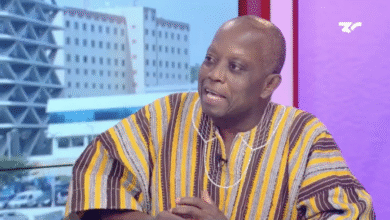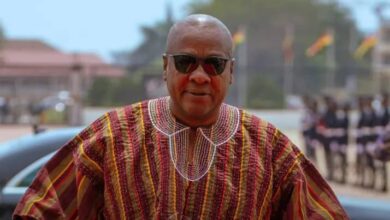Prof. H. Kwasi Prempeh urges government to amend the Code of Conduct to regulate display of ostentation by appointees

Chairman of the Constitution Amendment Committee, Prof. H. Kwasi Prempeh has called on the government, as a matter of urgency, to amend the code of conduct to regulate specifically public acts of charity and displays of ostentation by government appointees.
He is calling for a ban on the setting up of “private” foundations by public officers.
Adding that “the Code must put the class of public officers it covers on notice that, once you accept to serve in high public office, the “conduct” to which you would be held accountable includes the lifestyle and spending you display in public. The new Code must aim to reset our public ethics along multiple fronts”.
His comment comes on the back of a viral video of Sammy Gyamfi who is the acting Chief Executive Officer of the Gold Board, doling out dollar bills to Nana Agradaa.
The young chief executive has come under immense criticism from party folks and especially members of the opposition political party.
Sammy Gyamfi, realising his mistake, has issued a statement apologizing to the Ghanaian people for his actions indicating that he was just helping a person who is in need.
Read His Position Below
There is a reason why our politicians take “gifts” in private but give their gifts in public. They hide the former, because they and we know that those are forbidden bribes. Not so the gifts they give publicly. In fact, we hardly question such public gift-giving by our public servants. Depending on who or what cause they give to, they may be widely praised for their ostentatious display of “charity”. Thus, regardless of how hefty the amount of a gift is in proportion to the gift-giver’s known income, our “generous” public servants often get effusive praise if they donate to a church or mosque or school or for a needy patient’s medical treatment abroad. These are seen as worthy causes, so we don’t question how a person on a public salary could have come by the money for all that charity. Some even set up “foundations” to advertise and routinise their gift-giving, and some have been known to build and donate police stations for the police, when their only known source of lawful income is their official salary–yes, public servants on a fixed salary pretending to rival the Gates or Ford Foundation. We have come to accept all this as normal. In fact, those who have the temerity to question the source of such ostentatious charity are often dismissed and derided as busybodies: “Wo sika bi ayera anaa” (Has any money of yours gone missing) is a common retort.
The fact that we frown on or forbid gift-taking by public servants, treating them presumptively as bribes, as we should, yet celebrate or are indifferent to ostentatious gift-giving by the same persons betrays our insincerity or schizophrenic attitude toward corruption. We cannot be sincere or serious about fighting corruption if we dwell only on the gift-taking side of corruption, which is typically done in private or secret, while we leave the gift-giving side unregulated. The reason is simple: Usually, the only way to tell that a public servant is living beyond their means and, thus, likely the beneficiary of corruption is from the “spending” side of their lives, as that is the side of their lives that is hard to conceal entirely from the public. The “receiving” side is harder to detect because it is secret or hidden. Yet, in fighting corruption, we typically regulate the hidden “receiving” or “taking” part to the exclusion of the “spending” side.
A growing number of jurisdictions have come to the realization that you can seriously fight corruption by focusing on the secret “receiving”/taking side while ignoring the ostentatious “spending”/giving side of money. This is why lifestyle audits and unexplained wealth laws are becoming common tools in the fight against corruption.
The public uproar that has greeted the viral video of Mr Sammy Gyamfi, a prominent government appointee, doling out a gift of foreign cash from his car to a celebrity suggests that our public attitudes about such ostentatious gift-giving by public officers may be changing. Or is our largely negative reaction to the incident more about the identity of the person to whom the gift was made? Would our reaction be as condemnatory had the gift or donation been made to a school or congregation or a needy patient? Did Agradaa ruin everything for Lawyer Sammy Gyamfi? Did the young lawyer choose the wrong beneficiary for his act of ostentatious charity?
Going through the new Executive branch Code of Conduct, 2025, I notice that the section on Gifts regulates only the receiving or taking of gifts. Other than a pararagraph on hampers, there is nothing on public giving of “gifts” or other forms or acts of public “charity” by the salaried public officers who are covered by the Code. This is not surprising; the lack of attention to ostentatious gift-giving by salaried public officers is consistent with our general attitude of tolerance or acceptance of such gifts. I believe it is time to change this.
While we must not discourage charity or generosity in our society, unregulated public gift-giving and other ostentatious displays of charity by salaried public servants raise not just appearance concerns but legitimate questions about the source of the funds and, thus, undermine anti-corruption efforts. The Code of Conduct must be amended to regulate specifically public acts of charity and displays of ostentation by government appointees, including a ban on the setting up of “private” foundations by public officers. In short, the Code must put the class of public officers it covers on notice that, once you accept to serve in high public office, the “conduct” to which you would be held accountable includes the lifestyle and spending you display in public. The new Code must aim to reset our public ethics along multiple fronts.




